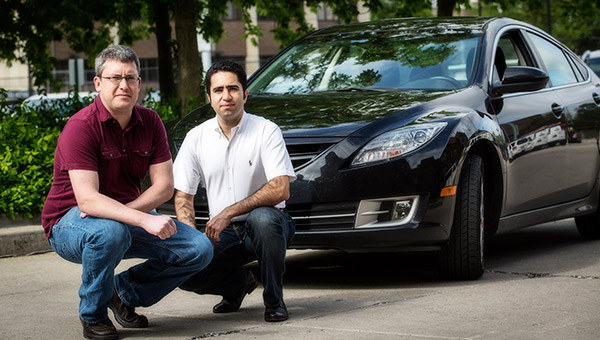In the first nationwide study of various state laws that ban text messaging on mobile devices while driving, two UWM economists show that such laws are associated with fewer traffic fatalities, but only under certain conditions – and only for the first few months after laws are announced.
Texting while driving is as dangerous as driving while intoxicated, says Associate Professor Scott Adams.
Using data from 2007-2010, Adams and doctoral researcher Rahi Abouk looked at vehicular fatalities after anti-texting laws went into effect and compare the numbers to legislation. They focused single driver, single vehicles crashes because it is the kind most likely to be caused by distracted driving.
They found that bans result in a moderate reduction in fatalities among these drivers, but they also found that the reduction is short-lived, lasting only a few months after a new law is announced.

“This is suggestive of drivers reacting to the announcement of the legislation, only to return to old habits shortly afterward,” says Adams, who counts behavior economics among his specialties.
Abouk initiated the study after Wisconsin enacted its texting ban at the end of 2010, and notes that enforcement of these laws continue to be a challenge. “Enforcing a texting ban is difficult because you can’t identify who is texting,” he says. “Drivers will have their phone in a place where it cannot be seen.”
Because of this limitation in enforcement, the pair looked at two kinds of laws – weak bans, which are narrow in scope and only are enforced as a secondary offense after one is pulled over for a different reason, and strong bans, which are enforced as a primary offense. Both kinds of bans showed the “announcement effect,” but only those that classified texting as a primary violation, demonstrated a related reduction in fatalities – and it was a small reduction of 8%.
Also important was whether the ban included use of all hand-held mobile devices while driving.
“This is a good policy indicator that for a ban to have results, it must be universal and considered a primary violation,” says Abouk, who is now a visiting assistant professor at Ohio University. “It’s an important field of inquiry because we want to determine what will have the greatest impact on improving roadway safety.”
Currently only nine states, not including Wisconsin, have bans in which all use of hand-held mobile devices is restricted and the offense is considered a primary violation.
“What we need is to find a way to take this as seriously as drunk driving because enforcement has shown to have an effect on fatalities caused by drunk driving,” adds Adams.







